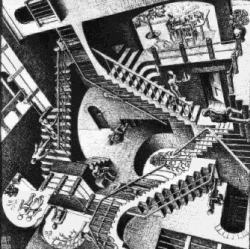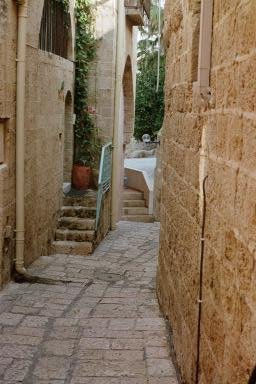 The 20th-century artist M.C. Escher went further, manipulating perspective in his paintings and drawings to produce three-dimensional paradoxes in a flat image. (The drawing here is called Relativity.)
The 20th-century artist M.C. Escher went further, manipulating perspective in his paintings and drawings to produce three-dimensional paradoxes in a flat image. (The drawing here is called Relativity.) I recall from boyhood a book with a number of line drawings under the heading, "when seeing is not believing." They were simple standard "optical illusions" which have been repeated many times – "Are the two lines in 1. the same length?" "Are the two lines in 2. parallel?" and so on.
I recall from boyhood a book with a number of line drawings under the heading, "when seeing is not believing." They were simple standard "optical illusions" which have been repeated many times – "Are the two lines in 1. the same length?" "Are the two lines in 2. parallel?" and so on.
 The 20th-century artist M.C. Escher went further, manipulating perspective in his paintings and drawings to produce three-dimensional paradoxes in a flat image. (The drawing here is called Relativity.)
The 20th-century artist M.C. Escher went further, manipulating perspective in his paintings and drawings to produce three-dimensional paradoxes in a flat image. (The drawing here is called Relativity.)
Things are not always as they appear to be and we frequently need others to "fill us in," to give us additional background and understanding, enabling us to perceive the truth about a person or situation.
From the Old Testament we learn that Joppa was the port through which cedar logs were brought from Lebanon for building (2 Chron. 2.16) and rebuilding (Ezra 3.7) the Temple in Jerusalem. It was where Jonah caught a ship to Tarshish to escape the Lord’s call (Jonah 1.3).
 Today it is Old Jaffa, part of the administrative district known as Tel Aviv-Yafo. Its streets are narrow and winding, quite unsuited to any of our modern forms of transport. There are some evidences of modernity – like a drainage system, street lights, railings…
Today it is Old Jaffa, part of the administrative district known as Tel Aviv-Yafo. Its streets are narrow and winding, quite unsuited to any of our modern forms of transport. There are some evidences of modernity – like a drainage system, street lights, railings…
Peter was in Lydda (Lod, located in the area where the Ben Gurion International Airport now stands). He had been encouraging the Christians there. Aeneas, bedridden for eight years, had been healed (Acts 9.32-35).
A message came from Joppa, about 16 kilometres away, for Peter to come at once. "In Joppa there was a disciple named Tabitha (which, when translated [into Greek], is Dorcas [the name means "gazelle"]), who was always doing good and helping the poor. About that time she became sick and died, and her body was washed and placed in an upstairs room" (vv. 37-38).
When Peter was taken to the upstairs room, he was met by a circle of widows "crying and showing him the robes and other clothing that Dorcas had made while she was still with them" (v. 39).
We don’t know a great deal about Dorcas – except that she was a believer who did a great deal of practical helping. There was no such thing as social security. Widows without a family were dependent on the generous support of people like Dorcas.
Peter remembers the time when, together with James and John, he had accompanied Jesus into the room where the daughter of Jairus lay dead. Jesus put out all the mourners and took the girl by the hand. He said, "Talitha kumi!" – which means, "Little girl, I say to you, get up!" (Mark 5.41). Recalling those words, Peter says, "Tabitha kumi!" – "Tabitha, get up!" (Acts 9.40).
Dorcas died later, of course. The healings (and resurrections) of this life are temporary. Our physical bodies are mortal and reach a stage when they can no longer sustain life. (This is why Paul, the tentmaker-apostle, calls our body "the earthly tent we live in" in 2 Corinthians 5.1. A tent is a temporary dwelling).
Much could be said about Dorcas and her very practical faith. We might also question the widows’ unwillingness to "let her go" – did they want her back just to keep on working for them? I think we should allow them the worthiest of motives!
Instead, let’s return to where we began with those illusions. Peter needed the widows to show and tell him about the kind of person Dorcas had been – otherwise he wouldn’t have known!
Have you ever been in the situation of caring for someone with very little idea of the personality that is now locked up in Alzheimer’s Disease and with no conception of their contribution to family or society? Perhaps it doesn’t happen as often in a smaller country centre as it does in the cities.
The terminology has all changed now, so that we talk about "clients". I suppose that speaks about the professionalism with which our care is offered. But little old ladies and gentlemen can so easily get lost in the midst of it all.
In the mist of our expert care, we need to be able to notice the "real person" under the weathered exterior and to lift their spirits – bring them encougagement in their later years.
| PRAYER: Heavenly Father, you see us as we are! You mean us to be like Dorcas – with a faith in you that moves into practical action. You also mean us to understand and care for people whose old abilities to converse and cope and help others are now gone. Help us to have skill and insight – and genuine love – we pray, in Jesus’ name. Amen. |
"Dare to be a Dorcas"?
words we never sang,
and yet…
as hard a task is done
by those who give
their lives to care
for every other one.
Dare to see the Dorcas
or the Daniel
over there.
The light has flickered,
almost gone –
and I’ve been asked to care…
to summon
what I do not know,
respecting
what I cannot see,
to let the hidden person
bound and weathered
be set free.
Back to Sermons